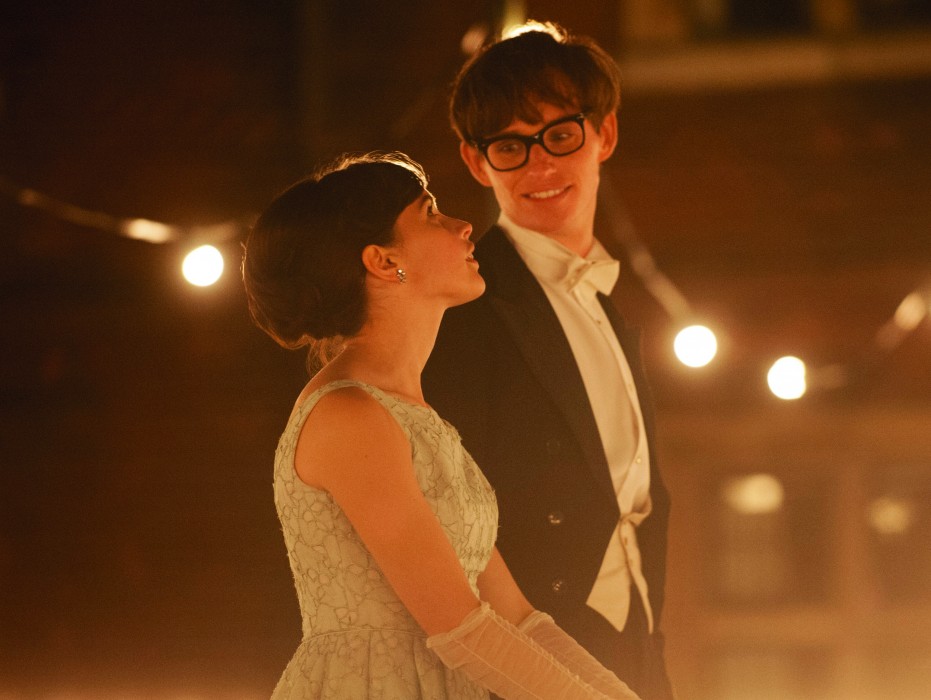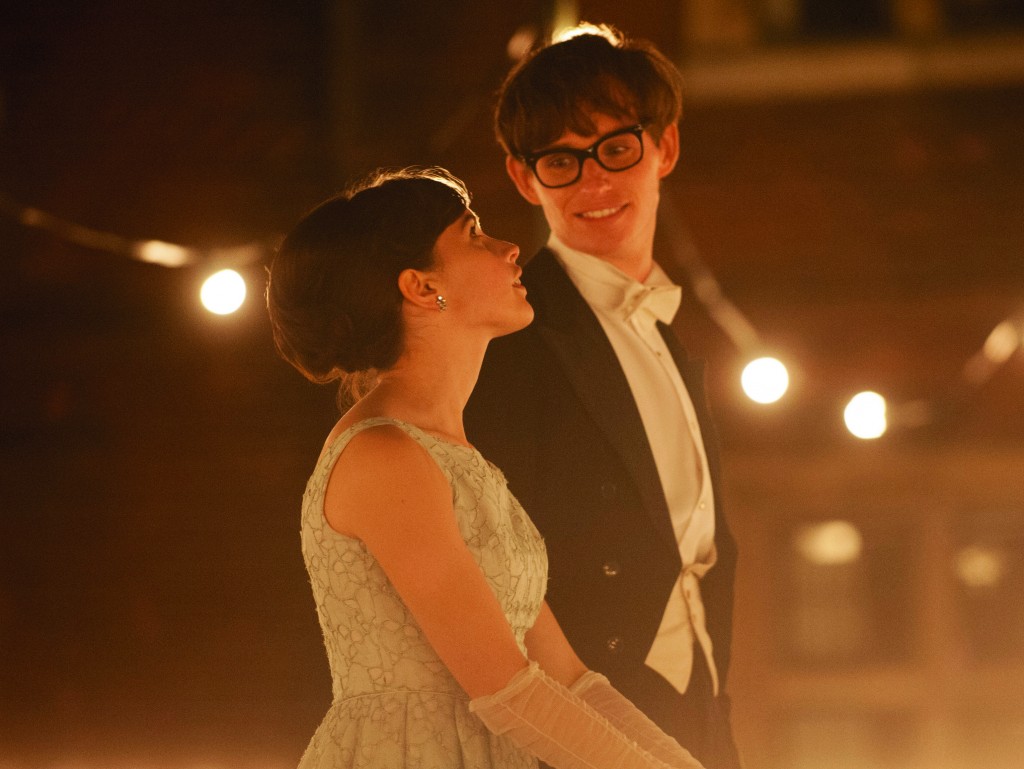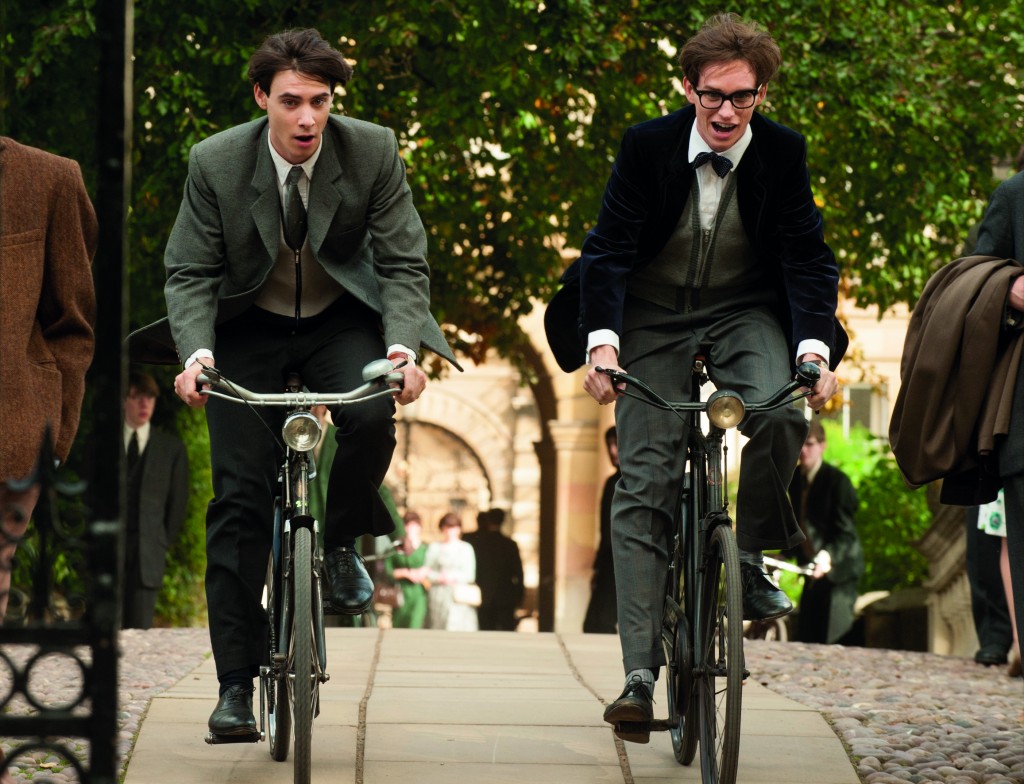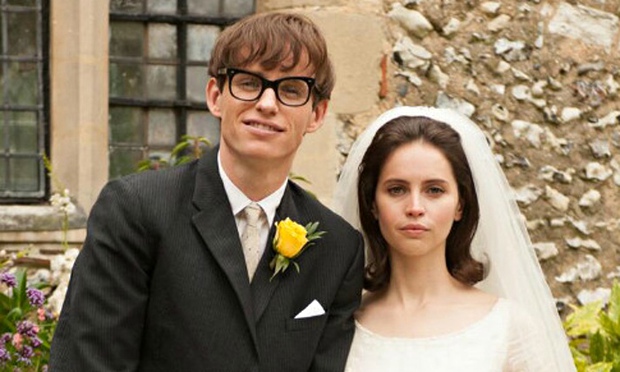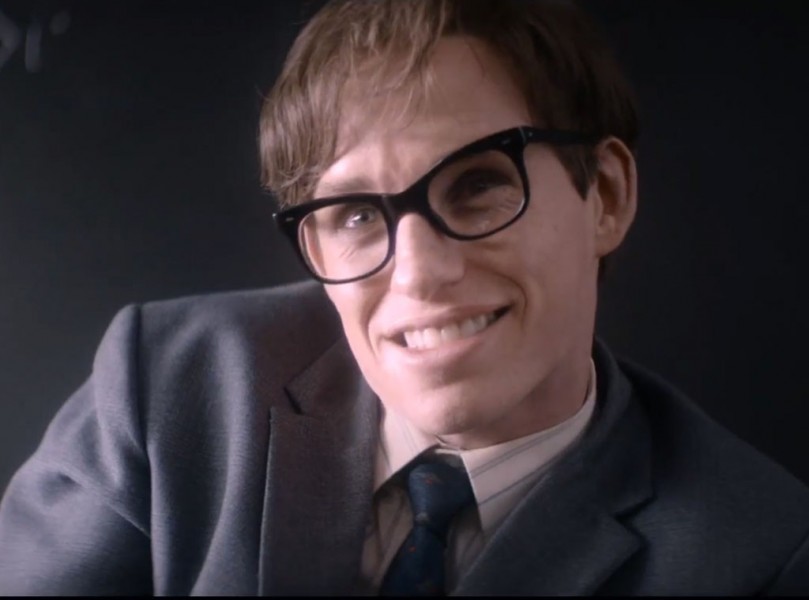Redmayne delivers a superb performance worthy of an Oscar nod.
![]()
Director: James Marsh
Starring: Eddie Redmayne, Felicity Jones, Charlie Cox, Emily Watson, Simon McBurney, David Thewlis
Running time: 123 min.
Throughout the year, we are treated to a huge array of fantastic films and as always there are some that you know will be a huge award season contender and without a doubt THE THEORY OF EVERYTHING is definitely one of them.
It seems 2014 is the year of the biopics and this Stephen Hawking film is definitely up there in terms of prestige, realism and execution with perhaps it’s biggest rival being the Alan Turing movie, THE IMITATION GAME. The theme of both biopics run very similar with Alan Turing and Stephen Hawking having personal battles to overcome and of course both of these films have superb scripting and exceptional performances from the cast, leaving the audience emotional, in turmoil and with utter respect for the men portrayed in the films.
THE THEORY OF EVERYTHING is a film which is so deeply moving it is virtually impossible for an audience to leave without pangs of such bitter sadness, but also with sheer admiration for a man who exceeds all expectations both scientifically and physically.
Said man is Stephen Hawking, an English theoretical physicist and cosmologist, who is one of the most famous scientists of our time.
At the start of the film, we see a young, vibrant Stephen Hawking (Eddie Redmayne) happily riding his bicycle with dreams of being a renowned scientist and his whole future ahead of him. Setting the scene at Cambridge University, we meet the intelligent student as he embarks on his career alongside his best friend, Brian (Harry Lloyd).
Within the first two minutes of the film, we see the initial, sweet meeting between the young pioneer and his future wife, Jane (Felicity Jones). Lingering glances and shy smiles aplenty are exchanged between the duo as we witness the start of their love story – and what a beautiful, heartbreaking honest tale it turns out to be for the next two hours, which takes centre stage of the film.
In James Marsh‘s film, Hawking is a hunched, focused Cosmetology student in 1963 Cambridge, who is polar opposite to Jane. They say that opposites attract and like magnets these two certainly do. He’s into Science and space, whilst she is studying for a PhD in medieval poetry. He’s quite shy and slightly awkward, whereas she is very friendly and more socially confident. Their differences prove not to be obstacles as the two students embark on the pleasures of young love as they flirt, date and enjoy embracing their differences on a daily basis.
Then, tragically, there is an obstacle that interrupts their course – a very big obstacle – that ends up changing both of their lives forever. Already wobbly on his feet and ignoring the warning signs in order to continue working on his theories, Hawking suddenly collapses to the floor on the flagstones of the university.
After intensive and rigorous investigations the results show that the young professor was unknowingly battling against the onset of motor neurone disease, whilst still only being in his early twenties. Diagnosed with the disease after this collapse, Hawking was initially given two years to live, but for the next 30, until their divorce in 1995, Jane devoted the best part of her life to looking after him and their three children.
Anthony McCarten‘s screenplay, which has been adapted from Jane’s memoir Travelling to Infinity, tells the story of the couple’s struggles over the years extraordinarily well. From endearing moments between the the professor and his wife (who has given up her career dreams in order to look after her husband and their children) through to their struggles dealing with Hawking’s physical decline, as Jane contends with the burden of care due to his worsening condition.
His inner turmoil is as clear to see as the physical disorder he is battling; but despite his bodily betrayal, the scripting allows us to develop a deeper understanding of the scientist; to learn more about his personality and character. Whilst many would have crumbled mentally, Hawking remained jovial and high spirited, still using great sense of humour to crack jokes, which brought a surprising collection of comical moments, providing the light-hearted periods of respite from the grim reality of the situation.
As time passes by, the audience witnesses the dramatic decline of his body as the pioneer is forced to heave his bent frame into a wheelchair. Needing support not just physically, but also emotionally Jane meets choir and music teacher, Jonathan (Charlie Cox), a young widower who gradually – platonically, at first – became a part of their home. It is no surprise to see a complex, three-cornered relationship with Jonathan providing impeccable support and sympathy that Jane needs as she finds herself trapped in a love-vs-responsibility dilemma.
The whole cast is brilliant throughout, but there is one person who stands out – Eddie Redmayne. Let’s be honest – it is his film. There is nothing more you could ask from his performance and there is nothing more he could possibly give. His transformation is astounding and he is so convincing in his physicality, credible in his pain and there are not enough superlatives to describe his nuanced, heartbreaking and evoking performance.
When words were impossible to muster for Redmayne as Hawking, his body language and expressions told the story all by themselves. In fact the most memorable and perhaps the most harrowing scene was almost wordless, as Hawking is slumped at the bottom of the stairs after a dinner party. His body fails to allow him to pull himself up the stairs and he desperately tries to make the ascent, but his body cannot muster the strength to move and all the while, his struggle is looked upon by his baby son, Robert. The desperation in Redmayne’s face at that moment is haunting and it is easy to temporarily forget that he is acting during his mute distress. So astute and so accurate is Redmayne’s delivery, one would be forgiven for thinking they are watching Hawking himself on the screen. His performance is beyond worthy of the award nominations he has been granted so far and perhaps there will be a golden Oscar statue with his name engraved into it..?
Not only does the film provide an insight into Hawking’s theories and the development of his pioneering work, it also opens our eyes to the man behind the machine that we see today; a man that was positive despite adversity, strong in mind although weak in body and brave despite the fear of what was to come.
The most poignant of lines that stand out from the two hour emotional roller-coaster is Hawking’s view on life, which he shares with students during a convention: “No matter how bad life may seem, there is always something you can succeed at. Where there is life, there is hope.”
Indeed, Sir, indeed.
And live Stephen Hawking certainly has – and what an inspirational life he has still managed to enjoy, which is told so perfectly throughout this film.
It is no surprise to see THE THEORY OF EVERYTHING performing so well during the impending awards season with nominations in both the Screen Actor Guild Awards and the Golden Globes – and quite rightly so.
There are films that move you and then there are films that hit you so heavily in the heart, it makes it almost impossible to breathe. It’s a respectable, moving effort and an astounding accomplishment celebrating the life of Stephen Hawking.
Verdict
![]()


